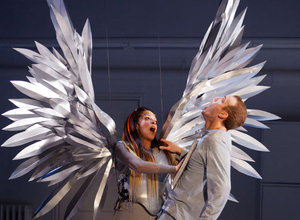
Photo Alexander Iziliaev
In Philadelphia, Wilma Theater audiences have been waiting for months for Perestroika, part two of Tony Kushner's epic Angels in America. Wilma director Blanka Zizka orchestrated a seismic production of Millennium Approaches earlier this year, framed by the starkly effective set design by Matt Sanders and lush sound designs Chistopher Colucci.
Few plays with huge colliding social themes hold up as well as Angels 20 years after the fact, and few are as structurally solid and adventurous as Angels. It remains a sterling actor's play, renewed by generational interpretations. Editorially, it also delves, with continued relevancy, with deep chasms not only between gay and straight people, but culturally warring factions across the American landscape. At its heart, Kushner's "gay Fantasia on national themes," written at the height of the AIDS epidemic, remains a j'accuse to a homophobic culture and a testament to gay solidarity at that perilous time.
Still, for all of its theatrical power, Perestroika (the Russian word for "reformation") Zizka has to deal with Part II's narrative overload. Sanders' design economy works against Kushner's lofty metaphysical terrain in the second play. Even with wonderfully kinetic cable flying and those Remington steel wing-spans, the most troublesome scenes are the ones in which the descending Angel explains the absence of God in the presence of worldly chaos. When Kushner is more rhetorically reserved, Zizka is more grounded, she handles such prickly scenes, for instance, as Prior ascending to the disenfranchised Angel counsel with wit and poetic humor.
At more than three and a half hours, Zizka 's character focus continues to unlock the play's searing core dynamic. In both plays, she brings more narrative balance to the female roles mostly in the roles of Harper and Mother Pitt. As Harper, Kate Czajkowki makes this ignored wife both more realized than written and much less a victim. Mary Elizabeth Scallen also manages to both soften Hannah and give her more spirit than just being a Mormon caricature; Scallen doubles as wry but cryptic ghost of Ethel Rosenberg. Maia Desanti is less effective as the Angel, she could modulate her voice more effectively, but her physicality is great.
Czajkowki has great combative chemistry with Luigi Sottile, wretchedly believable as the horny Mormon on the down low and as the compassionate 'buddy' who has faced up to himself as gay.
Stephen Novelli's Roy Cohn risked comparison to Al Pacino's bombastic HBO performance, but in Part II, he modulates Cohn's rages, giving him the grotesque pathos that Kushner intended. James Ijames' Belize, the moral center and pragmatist of Angels, is magical and true from every angle.
Aubrey Deeker's Prior gives nothing less than a heroic performance, the broken raw heart of Angels, facing up to the AIDS house of horrors. His comic moments, such as skulking around in black shrouds (looking like a cross between Martha Graham's Lamentation and Marty Feldman's Igor), are priceless.
Benjamin Pelteson has a lot of heavy lifting as Louis, the soul-searching cynic who rationalizes dumping Prior after his diagnosis and jumping into an affair with Joe Pitt. Louis also represents Kushner the self-doubting polemicist and Pelteson does a good job naturalizing the didactic nature of Louis's speeches. His key scenes with Sottile and Deeker also, like so many moments by this cast, are both subtle and operatic.
Wilma Theater, Philadelphia
through Oct. 21.
215-546-7824 | www.wilmatheater.org.
Both plays will be running in repertory during October

